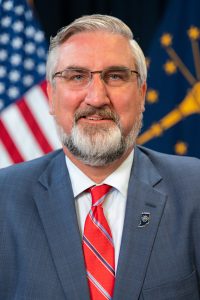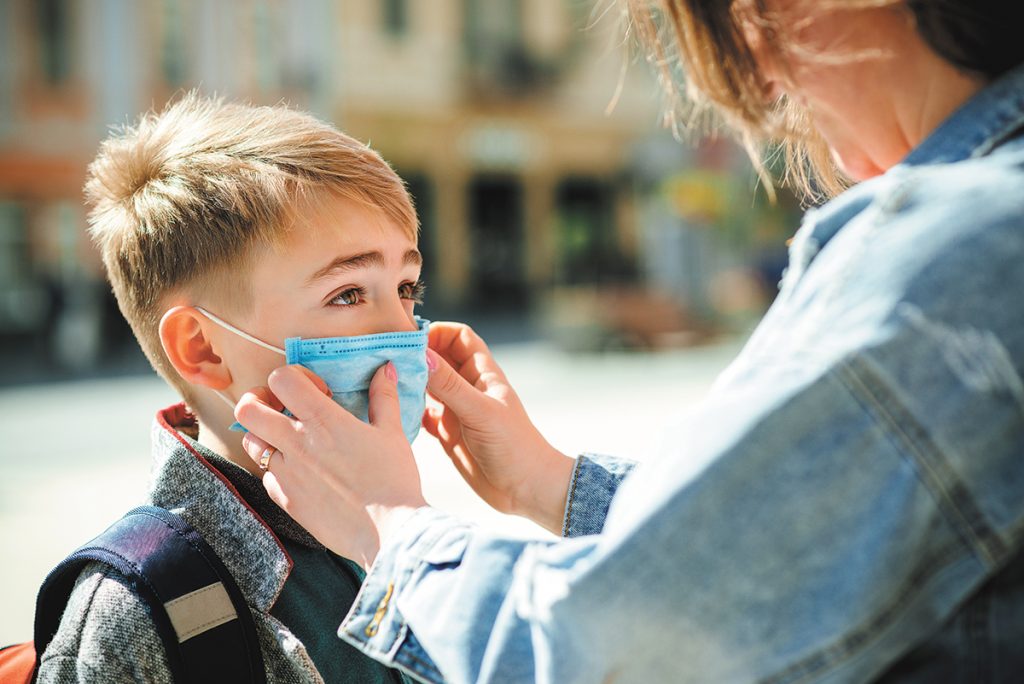Subscriber Benefit
As a subscriber you can listen to articles at work, in the car, or while you work out. Subscribe NowIndiana Gov. Eric Holcomb said he is comfortable with the difficult decisions his administration made to shut down schools, businesses and public gatherings during the height of the COVID-19 pandemic.
“I don’t have any regrets because I was operating with the information that I had at the time,” Holcomb told reporters Wednesday following prepared remarks he made to the Bipartisan Commission on Biodefense, a group formed in 2014 to conduct an assessment and make recommendations regarding U.S. biodefense efforts.

“I get it, to each their own. Everyone’s got an opinion,” he added. “I’m comfortable with the decisions that we made. Put yourself in a situation where you have multiple experts not agreeing with one another, and then you have to make the decision. And I was very comfortable. I slept well every night even though it was a very heavy time for our state and nation.”
The commission held a public meeting Wednesday at the Indianapolis Motor Speedway to discuss state and local efforts to strengthen public health and defenses to agricultural and biological threats.
In defending his administration’s response, Holcomb also pointed to the state’s strong economic rebound, which was due in part to federal stimulus funds.
His position stands in stark contrast with some held by leaders of his own party, who have said that Indiana waited too long to end COVID restrictions, to the detriment of small businesses, working families and children’s education.
U.S. Sen. Mike Braun, who is vacating his Senate seat to run for governor, introduced federal legislation earlier this month to ban federal mask mandates for schools, public transit systems and domestic air travel. The measure came following a surge in COVID cases in Indiana and across the U.S., stoking fears of possible mask mandates, lockdowns and other mitigation measures.
Braun has also promised to “never lockdown” the state if elected governor.
Former Indiana Attorney General Curtis Hill, who is also running for governor, said he would not require people in public universities, businesses, government offices or churches to wear face coverings.
Eric Doden, a Fort Wayne businessman running for governor, said the freedom of Hoosiers “was traded for government overreach” during the pandemic.
“We were told to trust the science, which now shows that mask mandates and extended lockdowns were detrimental to our children and small businesses,” Doden said in a written statement to Indianapolis Business Journal. “We won’t be doing any of that again under a Doden administration.”
In the 2021 legislative session, state lawmakers upset with pandemic restrictions gave themselves the power to intervene during public health emergencies. Holcomb filed a lawsuit in response, and the Indiana Supreme Court ruled that the law was unconstitutional.
Indiana’s COVID-19 restrictions were in line with many Republican-controlled states around the country.
The statewide mask mandate was lifted in April 2021, when fewer than 10 states had rescinded such requirements. Additionally, Holcomb signed a bill banning state and local governments from requiring vaccine passports.
Holcomb ended the state’s public health emergency on March 3, 2022.
Holcomb made public health a staple of his 2023 legislative agenda. State lawmakers approved about two-thirds of the money that Holcomb sought for a public health commission to address the state’s poor national rankings in areas such as life expectancy, smoking, obesity and improving local emergency services.
In his comments to the commission — which includes former lawmakers and public officials, including former Indiana Rep. Susan Brooks, who co-chaired Wednesday’s meeting — Holcomb also touched on Indiana’s vulnerability to public health threats and the state’s effort to land a tech hub.
Heartland Bioworks, a consortium of Hoosier stakeholders in the fields of advanced manufacturing and biotechnology, submitted an application to the United States Economic Development Administration for official designation as a Regional Technology and Innovation Hub.
“I would encourage this commission to consider the relevance of Bioworks, and others around the country, to our nation’s biodefense and biotech readiness,” Holcomb said. “This is the work that we’re doing, and it goes hand-in-glove with your mission. I think it will be complementary.”
Indiana was one of eight states selected for a U.S. Department of Defense regional technology and innovation hub that will be part of a federally funded national network of centers supporting domestic production of microelectronics, semiconductor manufacturing and other advanced technologies.
Please enable JavaScript to view this content.

